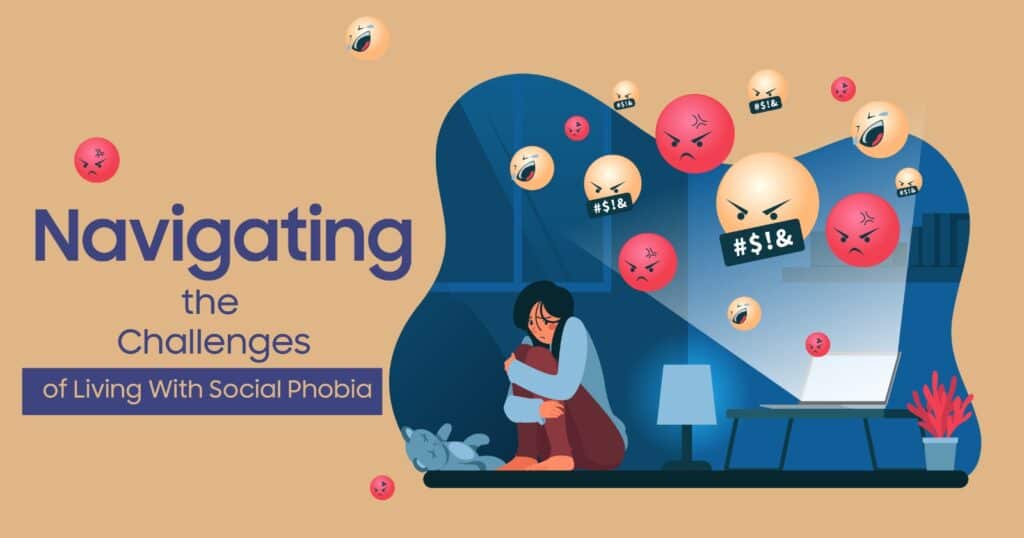Social phobia is also known as Social Anxiety Disorder and affects thousands of different people around the world. To those who suffer from this condition, speaking in public, meeting new faces, and even making a phone call becomes highly daunting and almost impossible to do.
Although social anxiety can adversely affect a person’s life, the guide can show them ways to escape and overcome it. It will encompass symptoms, causes, diagnosis, treatment options, and practical solutions that help an individual feel better and gain confidence in social settings.
Social Anxiety Disorder
Social Anxiety Disorder is a mental health condition where suffers experience intense fear of being judged, embarrassed, or rejected in social situations. It significantly differs from the typical anxiety that perhaps most people experience now and then.
On the contrary, social anxiety is persistent, always manifesting itself as an interference in the daily run of life. Individuals suffering from this condition feel compelled to avoid social situations, as they are likely to bring on feelings of humiliation or unfavorable judgment.
Symptoms of Social Anxiety Disorder
The different types of symptom manifestations concerning social anxiety involve the emotional, physical, and behavioral types that affect a person’s life. The following are some signs that an individual can feel that come with social anxiety:
- Emotional Symptoms. Way too worried about impending social occasions, judgment paranoia, and intense self-consciousness in the presence of others.
- Physical Symptoms. Blushing, sweating, trembling, a racing heart, or even feeling like throwing up.
- Behavioral Symptoms. Avoid going out and require some time to establish eye contact with the person because of the quietness.
These symptoms may end up pushing an individual into isolation and social withdrawal in personal and professional relationships, and coping with social anxiety is a must-desired intervention to regain control over one’s life.
What Causes Social Anxiety Disorder?
Understanding the root causes of social anxiety becomes a key step toward finding practical solutions. Research suggests that a genetic, environmental, and psychological factor all held together in bringing this condition:
- Genetic Factors. Social anxiety often runs in families, and it is highly likely to have a genetic predisposition.
- Brain Structure. Overactivity of the amygdala (part of the brain controlling the fear responses) might heighten feelings of anxiety.
- Trauma Experience. Bullying, rejection, or embarrassing events in childhood can trigger enduring fears related to social interactions.
- Environmental Influences. Growing up in a too critical or controlling environment may increase the susceptibility to social anxiety.
Anyone can identify these causes and help themselves over time in managing social anxiety and address as well the core issues guiding one’s fears.
Diagnosing Social Anxiety Disorder
Diagnosis is the first and foremost important step to effective treatment for Social Anxiety Disorder. A qualified mental health practitioner, such as a psychologist or psychiatrist, can seek to evaluate symptoms through clinical interviews and assessments.
During the diagnosis procedure, professionals may:
- Talk about the frequency and severity of anxiety symptoms.
- Evaluate how symptoms cascade into people’s daily lives and relationships.
- Rule out if any other mental health conditions or physical ones would give rise to similar symptoms.
A proper diagnosis holds the key to the most valuable Social Anxiety Disorder solution, as it ensures that people get the customized support and guidance they need to interact with others.
Treatment for Social Anxiety Disorder
Dealing with social anxiety feels lonely and terrifying, yet there are effective treatment options available. These could completely diminish your symptoms, improve your quality of life, and help you regain confidence in social situations.

Counseling Therapy
Therapy stands out as one of the most effective ways to overcoming social anxiety. Numerous kinds of treatment are available for it, but among them, Cognitive Behavioral Therapy (CBT) is the entry point into this world of therapy. Here is a bit of everything:
1. Cognitive Restructuring
- Focuses on identifying and challenging negative thought patterns that contribute to anxiety.
- It helps individuals reframe their thinking, replacing self-critical or catastrophic thoughts with more balanced and constructive perspectives.
2. Exposure Therapy
- It entails a gradual and systematic exposure to that dreaded social situation, which gradually makes an individual more desensitized.
- It is a step-wise process that builds up confidence and helps to reduce avoidance behavior.
3. Group Therapy
- It supplies a judgment-free atmosphere with support, where one can practice social skills and share experiences by connecting with others facing similar challenges.
- Not only that but peer feedback and encouragement are beneficial for participants with the reinforcement of progress.
Therapy offers personalized tools and strategies to address the unique challenges of overcoming social anxiety, fostering lasting improvements in emotional well-being and social functioning.
Medication
In some cases, medication can be an effective supplement to therapy, particularly for individuals experiencing severe symptoms. Commonly prescribed medications include:
1. Selective Serotonin Reuptake Inhibitors (SSRIs)
It is often considered the first line of treatment for overcoming Social Anxiety Disorder. These medications, such as sertraline or paroxetine, help regulate serotonin levels in the brain, reducing symptoms of anxiety and improving mood.
2. Beta-Blockers
Primarily used to manage physical symptoms of anxiety, such as rapid heartbeat, trembling, or excessive sweating. Useful for specific situations like public speaking or performance-based anxiety.
3. Anti-Anxiety Medications
Typically, benzodiazepines, such as lorazepam or clonazepam, are prescribed for short-term use during particularly stressful or unavoidable situations. Due to their potential for dependence, these are used sparingly and under close supervision.
It is crucial to consult a qualified healthcare provider or psychiatrist to determine the most appropriate treatment plan. Medications are often most effective when combined with therapy to address both the physical and psychological aspects of social anxiety.
Holistic and Lifestyle Approaches
Beyond therapy and medication, adopting a holistic approach can further support recovery:
- Mindfulness Practices
- Meditation and deep breathing exercises can reduce stress and promote relaxation.
- Mindfulness helps individuals stay grounded in the present moment, minimizing anxious thoughts.
- Regular Exercise
- Physical activity releases endorphins, which improve mood and reduce anxiety levels.
- Activities like yoga or walking can be remarkably calming.
- Healthy Lifestyle Choices
- Maintaining a balanced diet, ensuring adequate sleep, and limiting caffeine or alcohol intake can enhance overall mental well-being.
- Support Networks
- Engaging with family, friends, or support groups provides emotional reinforcement and reduces feelings of isolation.
Taking the First Step
Social anxiety can be cured when one has traveled and paved the way to one’s goal, but it requires time and patience. Therapy, medication, or other health changes can help overcome this problem.
Such treatments help patients lead effective and fulfilling lives with improvement and bring about further social engagements. Ask a professional to create a tailored treatment plan and set the first stage toward a bright, excitingly anxious-free future.
Home Remedies to Support Overcoming Shyness
Professional treatment is chiefly concerned with shyness or social anxiety, but home remedies can also be integrated into it. These self-help strategies further enhance overall well-being and enable individuals to be in control of their growth journey.
1. Mindfulness and Relaxation Techniques
Mindfulness practices, including meditation, yoga, and deep breathing exercises, have decreased stress levels and promoted mental clarity. Regular engagement in these practices calms the mind and helps lessen the anxiety often associated with social interactions. For those beginning to implement a mindfulness routine, guided sessions might be helpful. These sessions can be carried out using smartphones such as Headspace or Calm.

2. Gradual Exposure Therapy
Gradually facing social settings will help to develop one’s confidence over time. For example, start with manageable ones like saying hello to a neighbor or making a short phone call and then progressively move on to more intensive situations like attending social events or a presentation. Such gradual exposure reduces the feeling of being overwhelmed, helping the user build upon the good experiences.
3. Healthy Lifestyle Choices
Adopting healthy habits can significantly improve mental and emotional well-being:
| Exercise | Regular physical activity releases endorphins, which act as natural mood elevators and stress relievers. |
| Balanced Diet | Nutrient-rich foods like whole grains, lean proteins, and fresh produce provide the energy and mental clarity needed for social engagement. |
| Adequate Sleep | A well-rested mind is more resilient and better equipped to handle anxiety-provoking situations. Aim for 7-9 hours of quality sleep each night. |
4. Journaling for Self-Reflection
This can bring a sense of clarity and tracking for one’s progress towards writing the thoughts, fears, and also achievements. The journal can identify triggers, reflect on conversations that went well, and develop achievable goals. Gradually, it will create awareness of self and reveal progress in an individual’s life.
Why These Strategies Work
This is an extra effort, as well as other stand-alone home cures for shyness and social anxiety. Managing incorporation into daily life will also strengthen resilience and self-confidence and prevent compromise on any professional therapy an individual may be undergoing.
In case these feelings of shyness or anxiety do not improve with the above self-strategies, reaching out for support from a mental health professional can help.
Understanding Social Anxiety & Seeking Professional Help
Social anxiety can be wrenching. It can be treated with the right kinds of support and the proper techniques. For a long time, one could tell what caused social anxiety and sought help through the working of professionals and self-help techniques that have been healthy pathways to building self-confidence.
Progress may not be swift, but the beginning is the most important thing. Fear shouldn’t be kept hidden. How about taking the first step toward a better life today?
Call to Action
Life with social anxiety is hard, but you can still have someone by your side. If you’re willing to go beyond the preparatory stage of overcoming social anxiety, then contact a mental health professional. A promising Social Anxiety Disorder approach can help you be more confident in relationships and live a more complete life. Don’t let fear stop the journey to wellness Today!
FAQ’s
- What are the early signs of social anxiety?
Some key early signs would be the perceived threat of being judged, minimal eye contact, and overwhelming nervousness in social situations. The earlier these signs are recognized, the more favorable the prognosis for effective social anxiety treatment.
- Can social anxiety go away on its own?
There may be cases of mild form, where time may be sufficient for improvement. More commonly, an intervention, usually in therapy or medication, is required to produce long-term relief.
- What should I do if I feel anxious in social situations?
Just try to notice your breath, the air going in and out of your body. Notice the colors and shapes around you. Exposure over time and professional assistance have a significant impact on the experience.
- Is there a difference between shyness and social anxiety?
Shyness is a part of personality, but social anxiety is diagnosable, to some extent, and impedes day-to-day life functions. So, there might be a need for professional support to deal with social anxiety.







